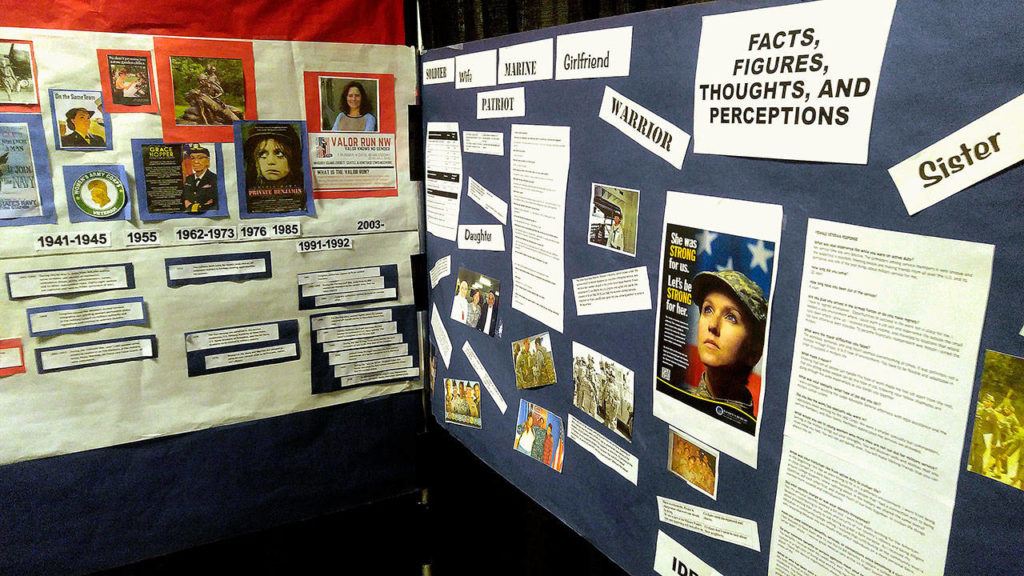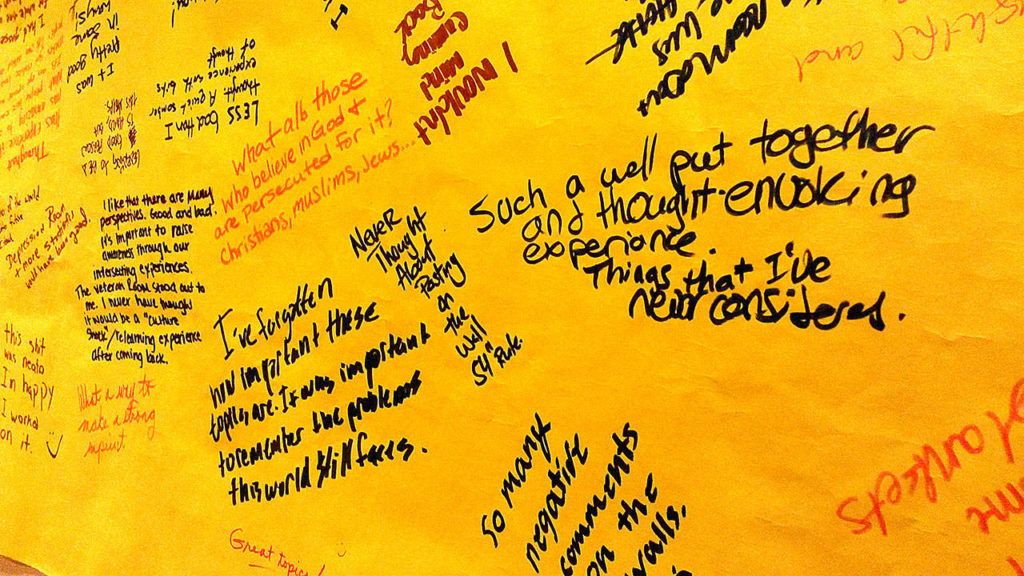In a tight space, curtained off by black fabric, I shut my eyes and listened.
A robotic-sounding voice from a computer’s text-to-speech system began reading. The document’s subject was the former NFL quarterback Fran Tarkenton. Its meaning wasn’t easy to grasp because the screen reader vocalized everything, including punctuation, spaces between words, even paragraph breaks.
That brief sensation of what a blind person might experience was part of an Edmonds Community College exhibit called “Tunnel of Intersections.”
In small groups, visitors to the display Wednesday and Thursday were guided through vignettes set up behind curtains in Woodway Hall. Each scenario depicted challenges or oppression experienced by people who often are marginalized — refugees, those with disabilities, women in the military, international students, transgender men and women, and those at risk of domestic violence.
This is the third year EdCC has hosted “Tunnel of Intersections.” A lesson in walking in someone else’s shoes, it was modeled after a Tunnel of Oppression program first presented at Western Illinois University and now seen on campuses around the country. The idea was inspired by the Museum of Tolerance in Los Angeles.
Daniel Griesbach was co-chairman of the event, along with Cathie Agor, associate director for diversity, recruitment and retention at EdCC. Griesbach, who teaches in EdCC’s precollege program, said the display is meant to strengthen the diverse campus community. Visitors were invited to jot down comments on papers covering walls and tables — spaces set aside for “graffiti,” event planners said.
“Very sobering,” said one comment. “Learning to be a good person is hard, but this helps,” another wrote.
There were opportunities for visitors to talk about what they saw. “It provides a safe and welcoming environment to discuss our differences,” Griesbach said.
I saw “Tunnel of Intersections” with a group of eight led by docent Farheen Saleem, who is on EdCC’s student government executive board. “Respect is paramount,” she said as our tour began.
My group was nearly silent as we took in each display. Strangers in close confines, we saw stunning photographs, disturbing accounts of life and death, and compelling questions.
In the scene devoted to an International Transgender Day of Remembrance, there were photos of murder victims. Among them were the images and grim stories of Rene “Rosita” Hidalgo, who in 2012 was gagged and stabbed to death in Florida; and Tiffany Rodrigues, a 23-year-old tortured and asphyxiated in Brazil last summer.
Saleem, who plans to transfer to Washington State University, said the area devoted to the plight of refugees was designed by a Palestinian man who spent 20 years in Syria. One powerful photo was of a Syrian father holding his young child in Europe. Its caption said his wife was lost in the Mediterranean Sea.
“Being a refugee is not a choice,” a poster said, and Saleem added that “these people are looking for safety and life.”
In the space designed by staff from EdCC’s Veterans Resource Center, visitors found a booklet for women veterans. Inside was a page devoted to “MST &Mental Health Care.” Reading the fine print, I learned that MST stands for “military sexual trauma.”
One section raised the specter of domestic violence by posing a situation: “Someone confides they want to end a relationship, but are afraid how their partner will react.” Its asks visitors to suggest ways they could help.
Another cramped section was simply paper painted like a tall brick wall. On sticky notes attached to it, visitors shared how that wall made them feel. Some wrote “Fear” or “Challenge.” But another said the wall represented “Hope.”
Last year’s “Tunnel of Intersections” was seen by about 250 visitors, Griesbach said. The event was planned long before President Donald Trump took office, but organizers couldn’t help but be aware of the current heated political climate.
Craig Kerr, an EdCC staff member on the Diversity, Equity and Inclusion Council, said it’s important to give voice to opposing points of view. “Are we really open to hear a more conservative perspective?” he said.
“We wanted to make sure it wasn’t political,” said Gerry Ebalaroza-Tunnell, who works with EdCC’s Equity and Inclusion Division. “We wanted everyone to share their truth.”
Julie Muhlstein: 425-339-3460; jmuhlstein@heraldnet.com.
Talk to us
> Give us your news tips.
> Send us a letter to the editor.
> More Herald contact information.



























